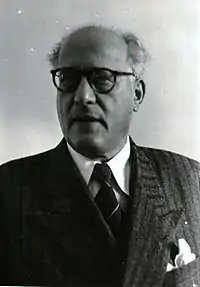Grzegorz Fitelberg
Grzegorz Fitelberg (18 October 1879 – 10 June 1953) was a Polish conductor, violinist and composer. He was a member of the Young Poland group, together with artists such as Karol Szymanowski, Ludomir Różycki and Mieczysław Karłowicz.
Grzegorz Fitelberg | |
|---|---|
 Grzegorz Fitelberg in 1930s | |
| Born | 18 October 1879 |
| Died | 10 June 1953 (aged 73) Katowice, Poland |
| Nationality | Polish |
| Occupation | Conductor |
Life and career
Fitelberg was born into a Jewish family (father Hozjasz Fitelberg, mother Matylda Pintzof, sister Leja Wacholder, 1881–1941, died in the Holocaust),[1][2][3] in Daugavpils, Russian Empire (now Latvia). Between 1906–07, he performed several times at the Berlin Philharmonic. In 1908 he conducted in the Warsaw Opera, and between 1912–13 in the Vienna State Opera. During the first war he collaborated with Ballets Russes; he conducted the first performance of Igor Stravinsky's Mavra at the Opéra Garnier in Paris. From 1921 to 1934 he was the chief conductor of the Warsaw Philharmonic Orchestra, where he excessively promoted new music. In 1935 he organized the Polish National Radio Symphony Orchestra.[4] Between 1940–41, he conducted at the Teatro Colón in Buenos Aires. Throughout his career, he performed in various locations around the world including Paris, Monte Carlo, Brussels, Vienna, Dresden, Leipzig, Moscow, Bristol, London, The Hague, Buenos Aires, New York, Montreal and Toronto.[4] He died in Katowice, Poland in June 1953.[4]
His son was the Polish-American composer Jerzy Fitelberg, who predeceased him. His second wife, Halina Schmolz, was a ballet dancer who died in 1939, from wounds suffered during the bombing of the Poniatowski Bridge. Their home, Willa Fitelberga, has recently been restored.[5]
The Grzegorz Fitelberg International Competition for Conductors, one of the most important music competitions in Poland, takes place in the Silesian Philharmonic since 1979.
Awards
- Order of the Banner of Work (Poland, 1950)[6]
- Commander's Cross of the Order of Polonia Restituta (Poland, 1947)[7]
- Knight's Cross of Legion of Honour (France)[8]
- Commander's Cross of the Order of the Phoenix (Greece, 1938)[9]
- Golden Cross of Merit (Poland, 1932)
- Officer's Cross of the Order of Polonia Restituta (Poland, 1927)[10]
See also
References
- "JewishGen.org".
- TROCHIMCZYK, MAJA (2005). "Reviewed work: Grzegorz Fitelberg—Korespondencja. Korespondencja Grzegorza Fitelberga z lat 1941-1953 [Grzegorz Fitelberg—Correspondence. Correspondence of Grzegorz Fitelberg from the Years 1941-1953)], Leon Markiewicz, Adam Labus, Sylwia Polek". The Polish Review. 50 (2): 232–237. JSTOR 25779543 – via JSTOR.
- "Warszawa | Wirtualny Sztetl". sztetl.org.pl.
- "Grzegorz Fitelberg". Retrieved 27 April 2020.
- Willa Fitelberga, Polska Niezwykla.
- "M.P. 1950 nr 75 poz. 864". Retrieved 27 April 2020.
- "M.P. 1947 nr 143 poz. 877". Retrieved 27 April 2020.
- "Grzegorz Fitelberg". Retrieved 27 April 2020.
- "Gazeta Lwowska". Retrieved 27 April 2020.
- "Gazeta Lwowska". Retrieved 27 April 2020.
External links
- Free scores by Grzegorz Fitelberg at the International Music Score Library Project (IMSLP)
- Official website of The Grzegorz Fitelberg International Competition for Conductors
| Cultural offices | ||
|---|---|---|
| Preceded by Henryk Melcer-Szczawiński |
Music directors, Warsaw Philharmonic Orchestra 1909–1911 |
Succeeded by Zdzisław Birnbaum |